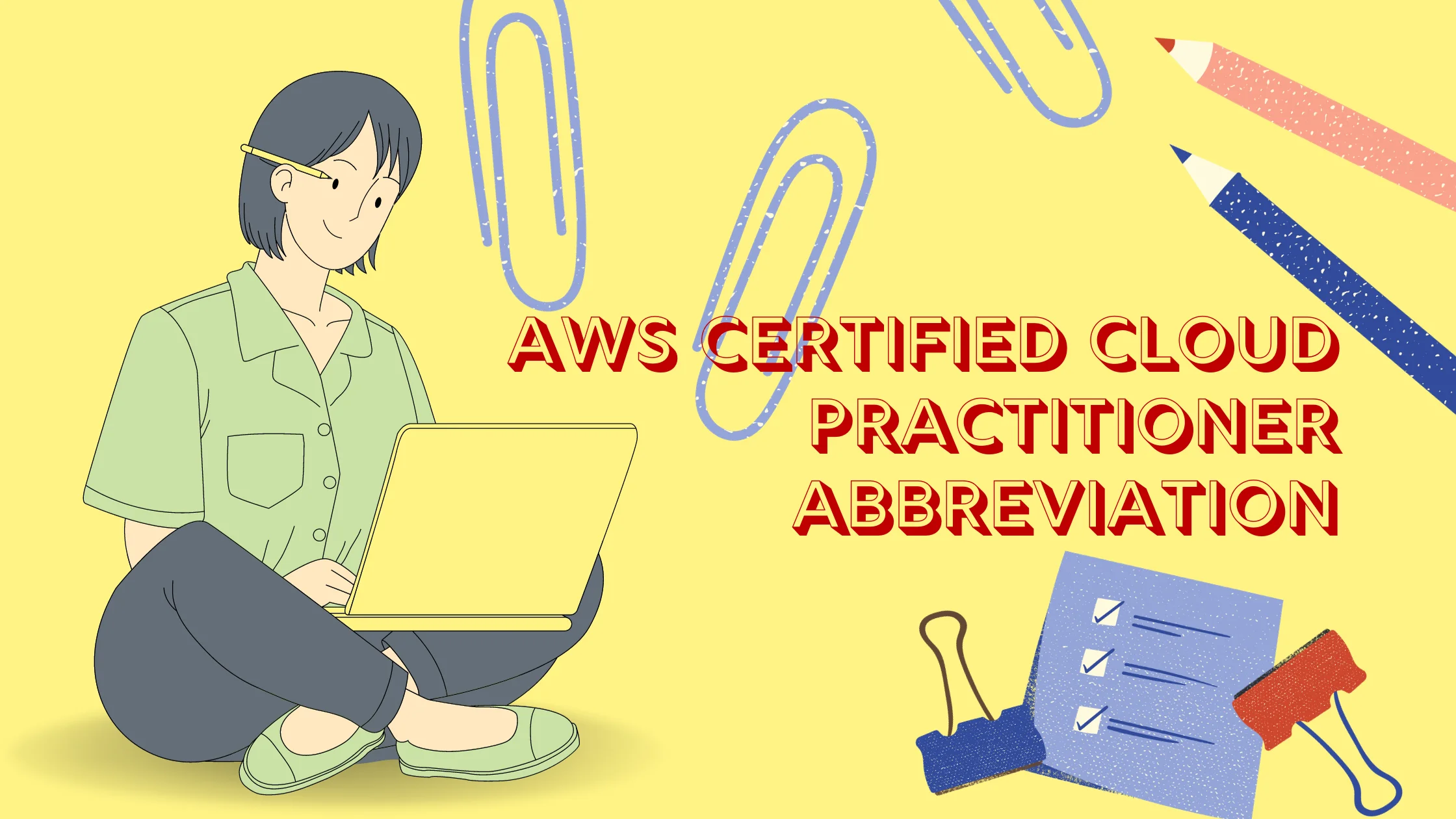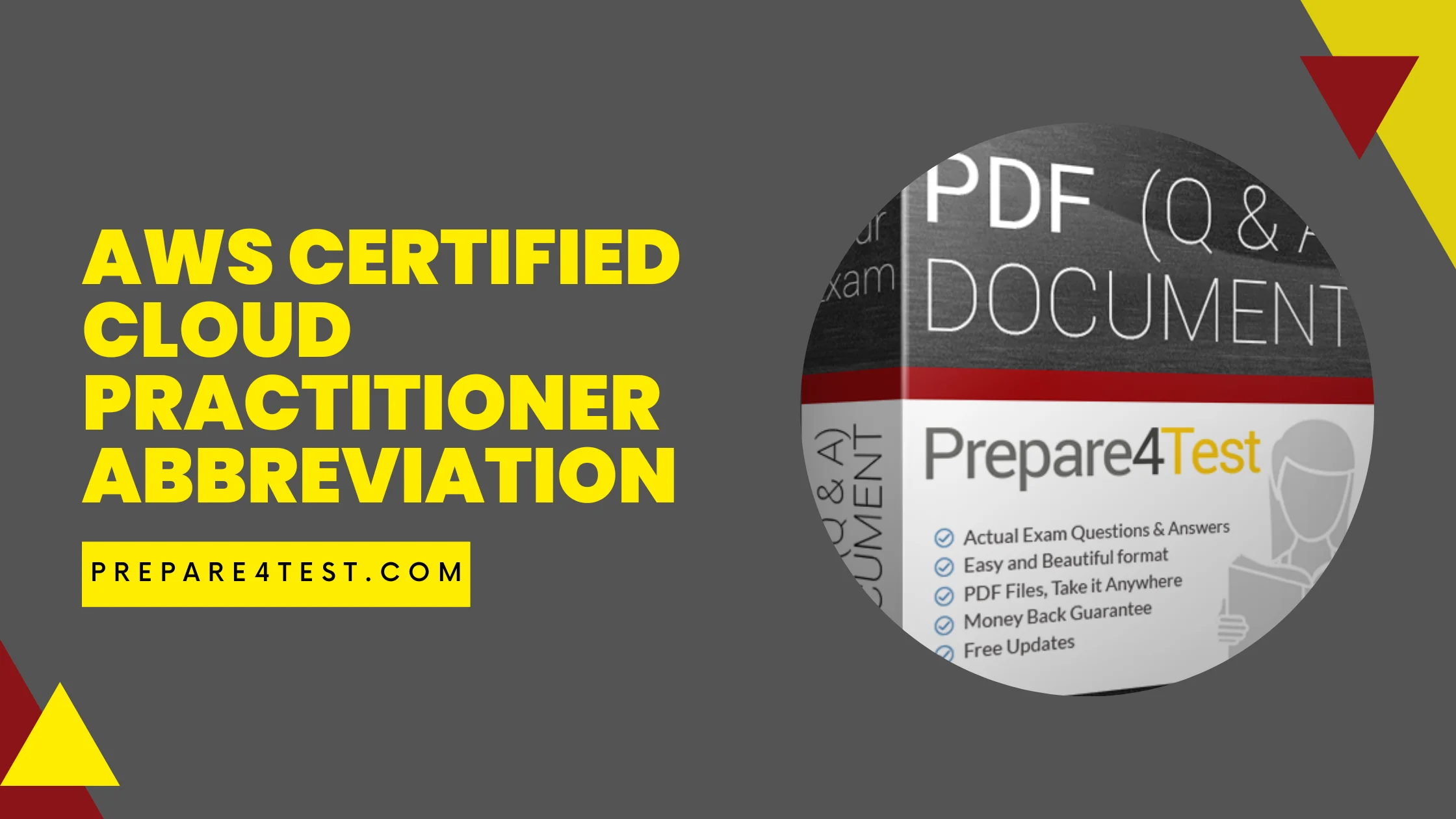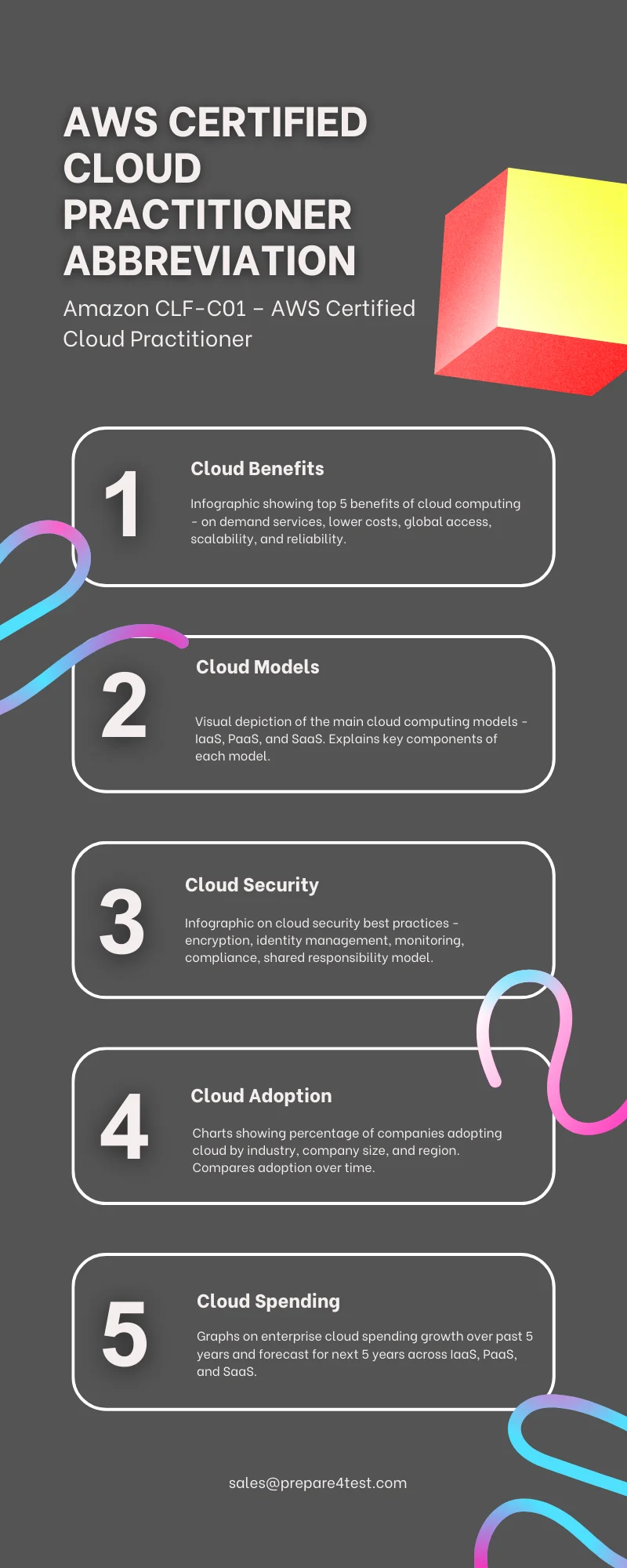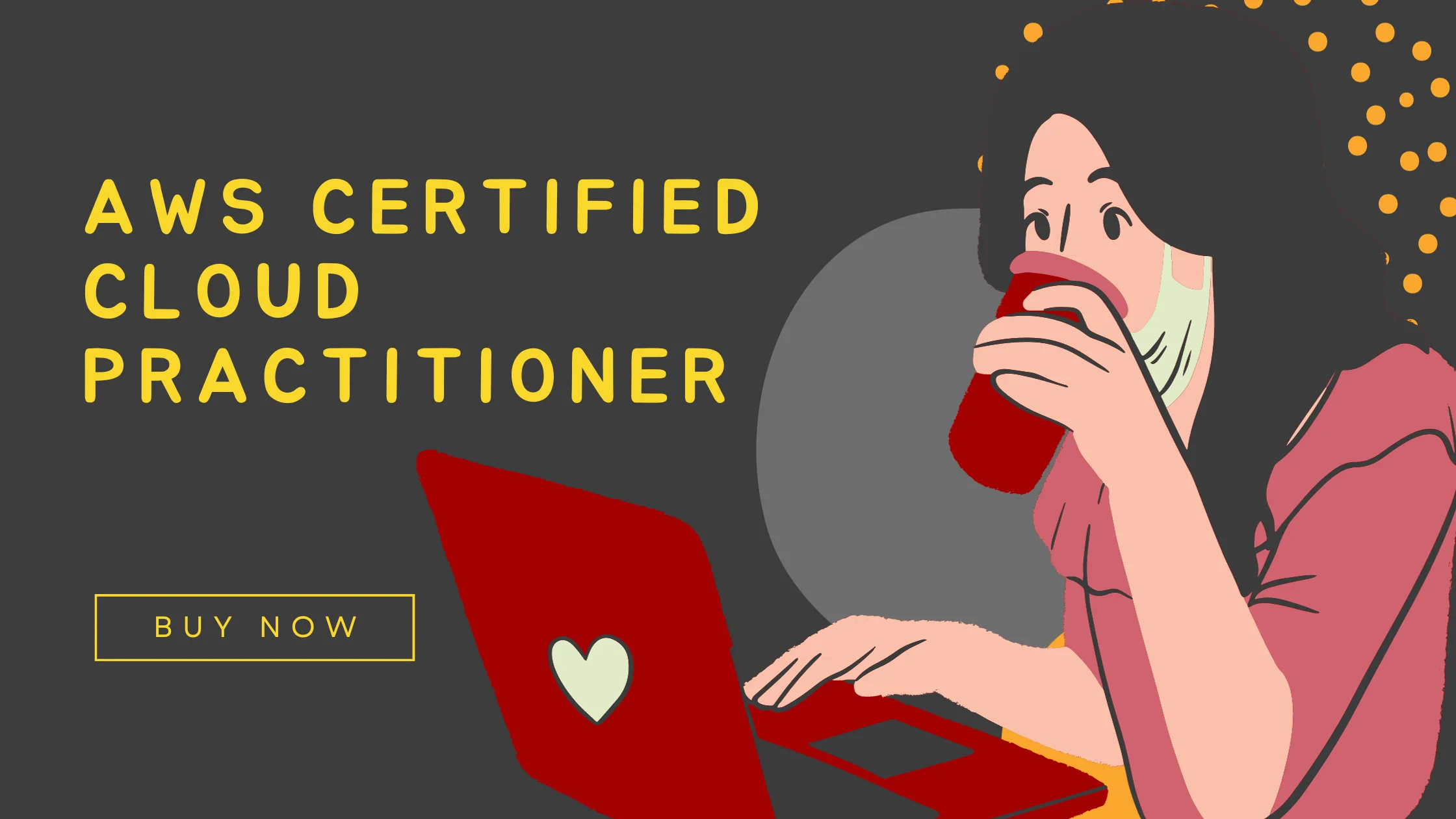
The AWS Certified Cloud Practitioner (CLF-C01) exam validates foundational knowledge of cloud services and the AWS platform. For individuals with little to no technical experience, this entry-level certification demonstrates a comprehensive understanding of cloud computing concepts.
The exam focuses on cloud concepts, security, technology, and billing & support. It covers a broad range of AWS services, features, and functionalities.
The CLF-C01 exam is a prerequisite to pursuing more advanced AWS certifications like Solutions Architect, SysOps Administrator, and Developer certifications.
Key Topics Covered in the Exam
Cloud Concepts
Cloud computing delivers fundamental benefits and value to organizations of all sizes looking to scale infrastructure on demand. The AWS Cloud provides instant, low-cost access to IT resources, enabling companies to innovate faster and reduce costs.
The key benefits of AWS Cloud include:
- Economies of scale – By utilizing shared infrastructure, In comparison to traditional data centers, companies have the potential to attain significant cost savings.
- Global reach – The AWS global infrastructure spans 25 geographic regions, allowing for low-latency deployment anywhere.
- Flexibility – Companies can instantly scale up or down to meet demands and only pay for what they use.
- Reliability – The AWS Cloud offers automatic recovery from failures and robust disaster recovery capabilities.
- Innovation – New technologies like IoT, machine learning, and serverless computing help companies innovate faster.
To transition to the cloud, organizations can use adoption approaches like lift-and-shift, re-architecting applications, or building cloud-native apps. AWS offers migration guides to help companies move based on their needs.
Overall, the AWS Cloud delivers economies of scale, global reach, flexibility, reliability, and innovation benefits that enable organizations to transform and accelerate business growth.
Security
Robust security practices are imperative for any organization adopting cloud services like AWS. A key concept is the shared responsibility model, which delineates the security responsibilities between AWS and the customer.
AWS secures the underlying infrastructure and foundation services. This includes physical security of data centers, hardware maintenance, software updates, and networking capabilities.
Customers are responsible for securing workloads in AWS by properly configuring services. Top priorities include:
- Managing user identities with AWS IAM to control access to resources. IAM enables granting least privilege permissions.
- Protecting data at rest and in transit through encryption using KMS. Encryption applies to services like S3, EBS, and RDS.
- Enabling logging and monitoring with CloudTrail and CloudWatch to retain audit trails of API calls and resource changes.
- Leveraging AWS security services like Macie for data protection, Shield for DDoS mitigation, and more.
Adhering to AWS security best practices is key for organizations to maintain robust security postures. Resources like the AWS Security Checklist provide prescriptive guidance to properly secure workloads in the cloud.
Technology
AWS offers a broad portfolio of core infrastructure services to support virtually any workload in the cloud. Key compute options include EC2 for resizable virtual servers and Lambda for serverless computing. For storage, S3 provides scalable object storage while EBS offers block storage volumes. RDS and DynamoDB provide managed relational and NoSQL databases.
For networking, VPC enables launching resources in a private virtual network, controlling IP ranges, subnets, route tables, and more. Direct Connect provides dedicated network connectivity from on-premises. Other core networking services include ELB for load balancing and Route 53 for DNS routing.
EKS and ECS allow deploying and scaling containerized applications. Analytics services like EMR and Redshift enable big data processing and warehousing. SQS, SNS, and SWF deliver messaging, notifications, and workflow orchestration.
Together, these services provide the fundamental building blocks for deploying secure, resilient, and efficient applications on AWS. The Well-Architected Framework provides best practices for using AWS services to architect optimal cloud solutions.
Support
AWS offers various support plans to help customers troubleshoot issues and optimize their use of AWS services. Support options range from Developer to Enterprise plans based on use cases. Higher tiers provide greater access to technical experts and proactive guidance.
The Business and Enterprise plans include a Technical Account Manager (TAM) to provide strategic advice and best practices. TAMs have deep technical expertise and work closely with customers.
All support plans give access to documentation, whitepapers, and support forums. The Developer plan offers email support for account and billing questions. Higher tiers provide 24/7 phone, email, and chat support for technical troubleshooting.
Customers can also leverage AWS Trusted Advisor, a service that provides recommendations to optimize cost, performance, security, and fault tolerance. Trusted Advisor analyzes AWS resource configurations and usage to identify potential improvements.
Managing service limits is important as customers scale their use of AWS. Limits can be increased by submitting requests to AWS Support. Understanding the default limits prevents hitting caps that could impact application availability.
Overall, AWS Support provides proactive guidance and reactive technical troubleshooting to help customers successfully utilize AWS services. The various plans offer flexibility based on an organization’s requirements and budget.
Preparing for the Exam
To succeed on the CLF-C01 exam, candidates should thoroughly prepare using recommended study materials and practice tests.
The AWS Exam Readiness course provides an interactive introduction to the exam’s topics and question formats. Completing this digital course ensures foundational knowledge across all domains tested on the CLF-C01.
In addition to the readiness course, exam candidates should study technical whitepapers and FAQs to gain deeper understanding of AWS services and best practices. Focus areas include the Well-Architected Framework, AWS Shared Responsibility Model, and core services for compute, storage, database, and networking.
Practice exams from Whizlabs and Tutorials Dojo mimic the real CLF-C01 format. Timed tests with 65 questions assess exam readiness and identify knowledge gaps. Reviewing detailed explanations for wrong answers is critical.
Sufficient preparation using official AWS training, whitepapers, FAQs, and practice tests enables confidently passing the CLF-C01 exam. Allow 2-3 weeks for study based on experience level. Schedule the exam only when scoring 85% or higher on practice tests.
Conclusion
The AWS Certified Cloud Practitioner certification validates overall understanding of fundamental cloud concepts and the AWS platform. It serves as an ideal starting point for individuals looking to gain knowledge about the AWS Cloud.
Key topics covered on the CLF-C01 exam encompass cloud concepts, security, technology, and support. Cloud concepts focus on the value proposition and benefits of AWS. Security covers the shared responsibility model, access management, and tools for governance.

The technology section assesses knowledge of AWS global infrastructure, core services for compute, storage, database, and networking. Support involves AWS plans, account management, and service limits.
Thorough preparation is imperative for passing the exam. Recommended study materials include AWS training courses, whitepapers, FAQs, and practice tests. Allow 2-3 weeks of study based on your experience level.
Earning the Certified Cloud Practitioner certification demonstrates you have fundamental understanding of the AWS Cloud. It validates knowledge across essential cloud concepts, security best practices, core services, and support. This foundational certification can lead to pursuing more advanced AWS certifications and roles.
Citations:
https://aws.amazon.com/blogs/security/auditing-security-checklist-for-aws-now-available/ https://d1.awsstatic.com/training-and-certification/docs-cloud-practitioner/AWS-Certified-Cloud-Practitioner_Exam-Guide.pdf


